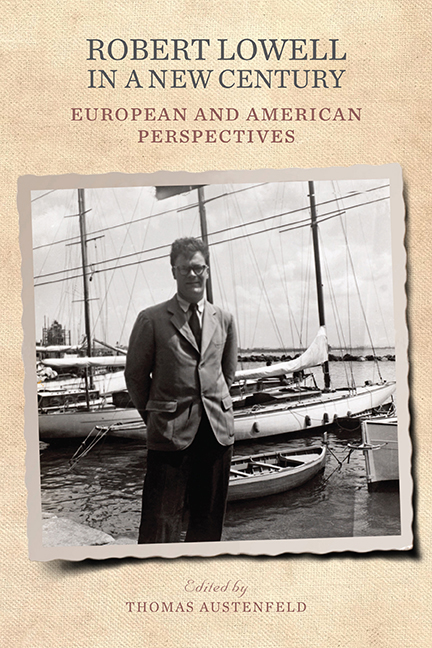Book contents
- Frontmatter
- Dedication
- Contents
- Acknowledgments
- Introduction
- 1 Revisiting Robert Lowell's Mental Hospital Poems
- 2 Sensual Drift and Ethnic Longing in Robert Lowell
- 3 Reworking the Same Water: Robert Lowell Transported
- 4 “Sweet salt embalms me”: A Hippocratic Approach to the Role of the Sea in the Poetry of Robert Lowell
- 5 More Delicate Than the Historian's Are the Map-Maker's Colors: Correspondences between Lowell's Poetics of History and Bishop's Poetics of Space
- 6 Robert Lowell and Ezra Pound's Economics
- 7 Robert Lowell and Ezra Pound in Washington and Rapallo
- 8 “Why Holland?”: Robert Lowell in Amsterdam
- 9 Lowell and Ungaretti: Imitations and Beyond
- 10 Robert Lowell's Credo
- 11 “Marriage? That's another story”: Reconsidering the Marital Trope in Robert Lowell's Poetry
- 12 “Oh No”/“Yes Yes”: Lowell and the Making of Mistakes
- 13 Robert Lowell: The Power of Influence
- Notes on Contributors
- Index
10 - Robert Lowell's Credo
Published online by Cambridge University Press: 26 June 2019
- Frontmatter
- Dedication
- Contents
- Acknowledgments
- Introduction
- 1 Revisiting Robert Lowell's Mental Hospital Poems
- 2 Sensual Drift and Ethnic Longing in Robert Lowell
- 3 Reworking the Same Water: Robert Lowell Transported
- 4 “Sweet salt embalms me”: A Hippocratic Approach to the Role of the Sea in the Poetry of Robert Lowell
- 5 More Delicate Than the Historian's Are the Map-Maker's Colors: Correspondences between Lowell's Poetics of History and Bishop's Poetics of Space
- 6 Robert Lowell and Ezra Pound's Economics
- 7 Robert Lowell and Ezra Pound in Washington and Rapallo
- 8 “Why Holland?”: Robert Lowell in Amsterdam
- 9 Lowell and Ungaretti: Imitations and Beyond
- 10 Robert Lowell's Credo
- 11 “Marriage? That's another story”: Reconsidering the Marital Trope in Robert Lowell's Poetry
- 12 “Oh No”/“Yes Yes”: Lowell and the Making of Mistakes
- 13 Robert Lowell: The Power of Influence
- Notes on Contributors
- Index
Summary
IN A LETTER TO Hannah Arendt dated January 9, 1961, Lowell refers to “Pigeons,” his enclosed imitation of Rainer Maria Rilke's “Taube, die draußen blieb” (Pigeon that stayed outside, 1950) as “really my own credo” and wonders if it “isn't quietly my finest poem,” which may reflect his dropping of the confessional “I” of Life Studies (1959). He wanted to put it out of chronological order and have it end his forthcoming Imitations (1961), which began with Homer and would otherwise have finished with Boris Pasternak, who had died in 1960. Lowell separated “Pigeons” from his four other Rilke imitations and dedicated it to Arendt, whom he thanks in the acknowledgments for her help with the German poems. His letter to her had begun “here's the Rilke,” as if she had been expecting it. Best known as a political philosopher, she was also a poet and keen reader of Rilke, with a particular fondness for “Taube, die draußen blieb.” I suspect that Arendt had put Lowell on to it.
This essay first addresses Lowell's poetics in Imitations with regard to how he made Rilke's “Taube, die draußen blieb” a poem of his own featuring two of his major tropes, hands and touch, exile and return, which underlie the “credo” embodied in “Pigeons.” He was probably attracted to Rilke's poem because the same tropes are central to it, and he responded to its rhythmical phrasing by adapting it within his own versification. I read “Pigeons” against the foil of his manic-depressive illness and his stubborn faith in the power of his art to transmute and transcend that illness. My interpretation of the poem along these lines will take account of two important studies as a key to Lowell's poetics, Kay Redfield Jamison's Robert Lowell: Setting the River on Fire—A Study of Genius, Mania, and Character (2017) and Nikki Skillman's The Lyric in the Age of the Brain (2016).
In the introduction, Lowell informs readers of Imitations that it is “partly self-sufficient and separate from its sources, and should be first read as a sequence, one voice running through many personalities, contrasts and repetitions.”
- Type
- Chapter
- Information
- Robert Lowell in a New CenturyEuropean and American Perspectives, pp. 131 - 144Publisher: Boydell & BrewerPrint publication year: 2019

